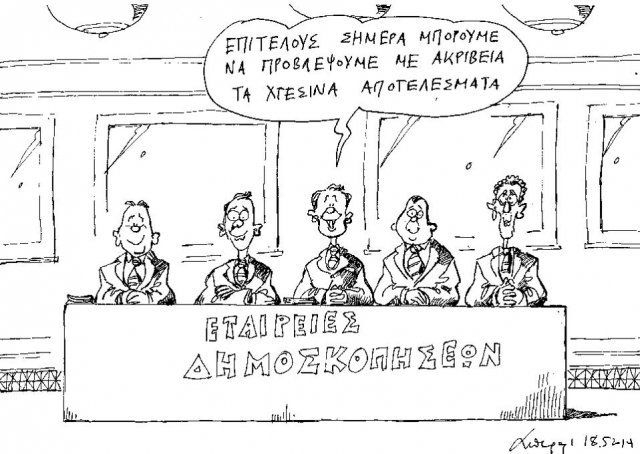Photo: kathimerini.gr
Anastasia Balezdrova
A day after the first round of local elections and less than five days before the second round, which will take place on the same day, the political situation in Greece is highly variable. The result of Sunday's vote gave a clear advantage to neither of the two major players on the political scene. Commentators expect the race to intensify in the remaining days, whereas both the ruling coalition between New Democracy and PASOK and the opposition SYRIZA party send the message that the vote in the European elections will be decisive for the future of the government.
GRReporter contacted political communications adviser Eftichis Vardoulakis to comment on the results.
How do you assess the results of the first round of local elections? Which party won and which one lost?
 There was no clear winner in the first round, as the two main opponents reported both gains and losses. New Democracy achieved remarkable success in the election results regarding the leadership of regional governments, but it lost in the two major areas. SYRIZA ranked first in Attica and, for the first time in the party history, its candidate will fight for the mayoral seat in Athens in the second round of the elections; in addition, the party achieved a higher result compared with the previous local elections (in 2010). However, yesterday's rate was below average compared to the parliamentary elections in 2012 and SYRIZA will fight for one area in the second round next Sunday. The rise of the party had not brought the whiff of victory that it expected.
There was no clear winner in the first round, as the two main opponents reported both gains and losses. New Democracy achieved remarkable success in the election results regarding the leadership of regional governments, but it lost in the two major areas. SYRIZA ranked first in Attica and, for the first time in the party history, its candidate will fight for the mayoral seat in Athens in the second round of the elections; in addition, the party achieved a higher result compared with the previous local elections (in 2010). However, yesterday's rate was below average compared to the parliamentary elections in 2012 and SYRIZA will fight for one area in the second round next Sunday. The rise of the party had not brought the whiff of victory that it expected.
Which criteria determined the votes of the electorate? Was it the party affiliation of the candidates or their ability to deal with local problems?
It was mainly the latter. This is evident from the discrepancy between the percentages of the parties and of their candidates in the local elections.

Dimitris Handzopoulos’ caricature depicting Golden Dawn in "Ta Nea" newspaper
How would you comment on the high percentage rates of Golden Dawn nominations? What is the reason for them?
Unfortunately, Golden Dawn has created a solid audience that always existed in Greek society. It was sheltered by other parties and only now has it found its political expression. This audience has been formed mostly on a nationalist and populist basis that many times has horizontally crossed the political system.
The economic crisis and the mistakes of the political parties before and after its breakout caused a political crisis as well as rejection of the political system. And in that moment of collapse the voice of Golden Dawn, filled with hatred and messages against the policy, had found a place and sneaked into it. All this combined with some existing problems caused by crime and immigration has significantly increased its rates.
In my opinion, without the events of recent months (the capture of the leadership on charges of creation of a criminal group, of deputies and members in connection with the murder of rapper Pavlos Fyssas and the revelations about the criminal activities of the party - author’s note), the percentage rates of Golden Dawn would have been even higher.

Polling agencies say, "Today, we can finally predict with accuracy yesterday’s results," Caricature by Andreas Petroulakis in "Kathimerini" newspaper
Why were polling agencies so wrong in forecasting the results?
Their failure is associated with methodological and political weaknesses. The Greek electorate is already quite specific and mobile and the shift from one political space to another often has no political logic. This complicates the assessment of the vote of those voters who, shortly before the elections, are undecided whom they will support.
Do you think the result of the first round of local elections reflects the political trends and the real power of the parties? Could it be taken as a harbinger of the outcome of the European elections?
No, it could not. These two electoral races are totally different. We cannot even predict whether there will be a bandwagon effect, i.e. if there will be a wave of support for the candidate who is holding the lead in the polls, or a backlash effect, in which voters vote to reject this person. I personally believe that the one who observes a more moderate behaviour will benefit the most.